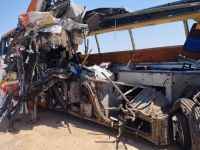High-level delegation from Japan Automobile Association visits ESMA
A high-level delegation from Japan Automobile Association (JAMA) visited Emirates Authority for Standardization and Metrology (ESMA) to discuss various issues, which relates mainly to the harmonization of exported Japanese vehicles with UAE’s standards.
One of the issues discussed was the new requirement for mini-vans/micro-bus, which according to a study conducted by UAE police authorities, have been involved in a higher number of road accidents compared to other vehicles. This study has prompted ESMA to devise a new set of requirements for these vehicles such as reducing the speed limit, creating a specific requirement with regard to the distance car seats, and limiting the number of passengers.
Eng Mohammed Saleh Badri, Acting Director General, ESMA, said: “We have thoroughly discussed how we can make our roads safer and our standards better. We have also agreed on a couple of new requirements, some of which were covered by the 2011 amendment on the Emirates Technical regulation.”
These amendments included mandatory head restraints in all seats, mandatory air bags for the driver and the front passenger next to the driver for all passenger cars and buses with capacity up to 22 passengers. Also, Anti-lock braking system (ABS) shall be used in all motor vehicles, in addition to the obligation to supply the front and rear-outboard seats of passenger cars and multipurpose vehicles with three-point safety belts, and the other seats and seats of all other vehicles shall be provided with either two point or three-point safety belt.
These amendments also prohibit any motor vehicles with a riding capacity of 4 persons or more (commercial vehicles) to be equipped with spare seats in the aisles, and the distance should be 300 mm between the seats except for emergency motor vehicles and child-carrying vehicles.
Every motor vehicle shall be equipped with a light and/or sound emitting device which automatically gives a warning to the driver when speedometer indicates a speed exceeding (120 ± 5) km / h. For buses with capacity of up to 22 the speed shall not exceed 100 km / h maximum. These amendments come into force with 2013 models.
Badri added: “The ABS requirement is not required in the entire GCC that is why we have to meet them and agree on these additional safety features. This way, we are acting pro-actively in ensuring the safety and lives of our people and prevent the possibility of any vehicle recall in the future.”
According to Japan External Trade Organization (JETRO), Japan’s vehicle exports to the UAE took the brunt of the fall in her exports during the first half of 2011, with a decline of 19.5%. Export of passenger motor cars went down 26.2% to $ 833.9 million from $ 1,13 billion. However, even in the face of the general decline, export of small cars segment (1000 -1500 cc) showed an increase of 12% to $ 68 million in the place of $ 60.7 million in the previous year. Similarly export of diesel engined passenger cars has also increased during this time by 48.4% to $ 59.2 million, compared to $ 39.9 million in the same period of the previous year. However, in the backdrop of the fall in the export of passenger motor cars, export of parts and accessories for vehicles began to rise and reached an all time high of $ 181.7 million during the first half of the current year, compared to $ 160.3 million during the same period in 2010.
There had been a steady increase in the export of passenger motor cars from Japan to all the GCC counties during past few years, except in 2009 when the global financial crisis affected world trade as a whole. Japan’s passenger motor car exports to all the GCC countries declined during the first half of 2011 due to the effects of the earthquake and the tsunami as well as the appreciation of Japanese Yen. But in the case of UAE, figures for the months of June and July, however, are showing promising surges in the export of passenger cars to the GCC countries as a whole.






